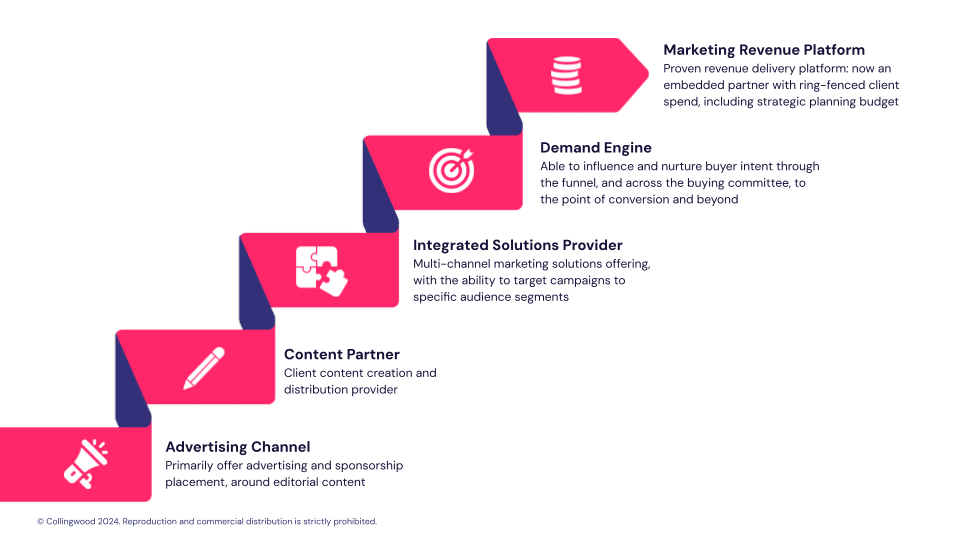As B2B media, information and events entrepreneurs continually reassess how to provide value to their customers, many in the marketing services arena find it challenging to make the journey from being an Advertising Channel, Content Partner or Integrated Solutions Provider to offering a genuine Demand Engine service – a process which sets the foundations for the leap to becoming a high value Marketing Revenue Platform. (See Figure 1 for more information on these terms.)

Figure 1: The Collingwood Marketing Services Maturity Model
A Demand Engine service creates content and generates leads through engagement with that content, before segmenting those leads in order to identify and engage specific groups. Crucially, it will then go on to nurture buying intent along the customer journey. The nurture of the lead is key to the journey shown in Collingwood’s Marketing Services Maturity Model.
While some B2B media brands will feel that they are already operating Demand Engine services, most are yet to fully reach this crucial fourth stage of the Marketing Services Maturity Model and tend to be stuck in a ‘lead generation loop’, not quite moving to the later stages of maturity where value is delivered across the entire marketing and sales funnel.
Becoming a Demand Engine service is not just about encouraging the completion of a lead generation form to download content. It is about engaging the lead multiple times, asking deeper questions of the lead, or building a picture of who they are through their behaviour, to identify a real level of interest in a particular solution – a real level of intent.
To enable this, building out a true Demand Engine requires a company-level view of the lead, as well as a focus on the individual. Decision-making units (DMUs) are often sizeable, and the best Demand Engines enable nurture across the DMU, engaging buyers and influencers across the client’s target organisations.
Rethinking value: beyond simple lead generation
Operationally, demand generation often manifests as one of a number of marketing services provided by the media brand, each with their own set of processes and KPIs, rather than it being the core service, with all other marketing services, processes and KPIs aligned in pursuit of this goal. However, operating a Demand Engine means that it becomes the core business process, one in which all elements work harmoniously to deliver value for clients.
It therefore requires a fundamental rethinking of what it means to provide value to clients, and to move beyond providing simple lead generation services. Making that leap is becoming imperative as clients increasingly demand campaigns that deliver measurable ROI and meaningful impact on business outcomes.
Moving up the Maturity Model is an opportunity for B2B media businesses to better delight their marketing clients. A true, always-on Demand Engine enables marketers to become ‘heroes’ in their organisations by supporting their sales teams with better quality leads. If yours is the service that turns your client into a hero in their organisation, then you can expect to reap the rewards in terms of loyalty and spend.
What’s more, investors in marketing services businesses are seeking businesses that offer sophisticated client–vendor offerings and diversified revenue streams. The ability to provide segmentation, compelling content and tailored campaigns, underpinned by a sophisticated first-party data strategy is now a requirement for ambitious independent marketing services businesses. In other words, being a mature marketing services provider that has reached – or is within reach of – the Demand Engine stage.
Building a demand engine
The data barrier
Demand Engines are hugely valuable but they aren’t always easy to establish. Building a Demand Engine requires the sophisticated use of data and analytics to understand and influence the buyer’s journey. It’s in that management of data where many B2B media businesses come unstuck.
A material blocker for B2B media businesses on the Marketing Services Maturity journey is thinking that they can’t draw on third-party expertise and data to develop their first-party data strategy. While Demand Engines require the sophisticated use of first-party data to deliver customer experiences and high-quality campaign performance for clients, this doesn’t preclude the use of third-parties to reignite cold data or access new markets.
Compliance with relevant privacy laws throughout the process is vital, ensuring the right lead is generated, that the lead engages with owned content, that it is verified and nurtured, and that it meets the client’s Ideal Customer Profile (ICP) criteria. All of this can be achieved – or even enhanced – by third-party providers.
Key steps to success
It isn’t just about data, of course. Building a Demand Engine requires:
- Scalable sales packages and pricing, as well as an integrated sales process that makes it easy for the sales team to sell it and for the client to keep buying more
- An effective user journey, driven by content, recommendations and effective use of channels that generates leads. Such is the importance of content, the most effective Demand Engines often have a dedicated commercial content team that plays an active role in client delivery, as opposed to a separate content team that leaves those in sales and client success to understand and engage the client.
- A deep understanding of the genuine challenges that clients are facing. Understanding how a client’s sales organisation is structured and how you can better help them is vital for Demand Engine success. The more people in your business that understand this, the better.
- Getting as close as possible to your client. Integrate with the customer’s tech stack and educate their sales teams to understand how to use your lead data to their benefit. In short, it’s about helping them to get as close as possible to their buyer.
Make steps in this direction and your journey to becoming a Demand Engine has begun.
Not sure how to make the leap to Demand Engine – or beyond? Download Collingwood’s Marketing Services Maturity Model to start your journey to becoming a higher-value business. Our team of expert advisers are on hand to help you take the next step.
Contributors: Paul Franklin



